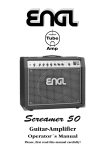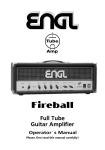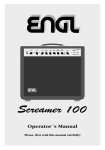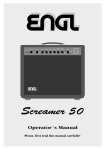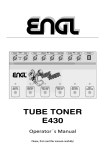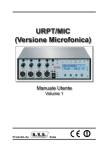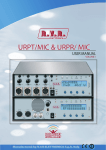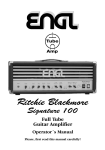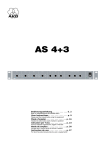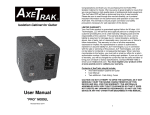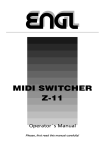Download ENGL Thunder 50 Reverb E320
Transcript
Thunder 50 Guitar-Amplifier Operator´s Manual Please, first read this manual carefully! Thunder 50 - is an all-tube guitar amp, fully loaded with all key features. Next to its sonic qualities, the beauty of this amp is rooted in simplicity. With its uncluttered, sensibly arrayed control features, the Thunder comes complete with everything you need to dial in first-class sound. Handling couldn't be easier. With the Thunder, what you see is truly what you get-great looks, great sound. The latest in a line of classy amps, the Thunder delivers that unmistakable ENGL sound-warm, creamy and extremely dynamic tube tone. This operating manual covers three different versions of the amp, the Thunder 50 Combo (model E322), the Thunder 50 Head (model E325) and the Thunder 50 Reverb (model E320), a Combo version equipped with a spring reverb. Quality components, excellent workmanship and strict quality control ensure this amp retains its value. You'll find guidelines on care and maintenance of tube amps on the last page of the manual. Please read and heed these before operating your amp. You'll also come across boxes shaded grey throughout the manual. These are located between the descriptions of the amp's functions and contain handy tips on the preceding function. All critical information pertaining to the operation of this amp is preceded by "NOTE" or "CAUTION." Please pay particular attention to these safety tips. The team wishes you all the best—may you and your amp enjoy a "harmonically rich" future together! Front: Thunder 50, Type E322 & E325 Input Gain Bass Middle Treble Crunch Volume Lead Volume Crunch Lead Thunder 50 Master Clean Lead Tube Amp 1 2 3 4 5 6 7 8 9 10 Stand By Power 11 12 Front: Thunder 50 Reverb, Type E320 Input Gain Bass Middle Treble Reverb Lead Volume Crunch Lead Master Clean Lead Thunder 50 Reverb Tube Amp 1 2 3 4 5 6 7* 8 9 10 Stand By Power 11 12 1 Input Input¼" unbalanced input. Plug your guitar cord in here. 2 Gain Controls input sensitivity. Use this knob and the Master (10) control to adjust the volume of the Clean channel. For the Crunch and Lead channels, Gain controls the amount of preamp distortion. TIP: Using different combinations of Gain, Master and channel Volume knob settings, you'll be able to come up with a vast range of great sounds for the three channels Clean, Crunch and Lead. Check out the diagram at the right to see our suggested Crunch channel Gain settings for the two most popular types of pick-ups. 3 Crunch / Lead Channel selector pushbutton for Crunch and Lead modes in the Lead channel. This function can also be activated via a footswitch (jack 15). Once a footpedal is connected, the channel selector pushbutton is deactivated. CAUTION: Extremely high gain and volume levels in the Lead mode can produce strong feedback. Avoid feedback squeals, they lead to hearing loss and damaged speakers! 4 Bass Bottom end voicing control. 5 Middle Mid-range voicing control. 6 Treble Upper range voicing control. TIP: To get an idea of this amp's capabilities, we suggest you set the tone control pots Bass (4), Middle (5) and Treble (6) to the 12 o'clock position. For extremely soft lead, blues or jazz sounds, try setting the Treble knob to somewhere in the 8-to-11 o'clock range. For aggressive metal riffs or spanky funk sounds, go for something in the range of 11 to 3 o'clock. 7 Crunch Volume (Combo model E322 and Head model E325) Volume control for the Crunch channel. Use this knob to adjust the balance of levels between the Crunch and Clean and Lead channels. Note: In the signal chain, this knob is located before the effects loop, meaning that it influences the send signal of the effects loop. 7*Reverb (Thunder 50 Reverb, Combo model E320 only) This knob controls the amount of reverb. As you rotate the knob clockwise, the intensity of the reverb effect increases. 8 Lead Volume in Volume control for the Lead channel (and the Crunch channel at model E320). Use this knob to dial the desired balance of levels between the Lead (& Crunch at model E320) and Clean channels. Note: In the signal chain, this knob is located before the effects loop, meaning that it influences the send signal of the effects loop. 9 Clean / Lead Channel selector pushbutton for Clean and Lead channels, red LED indicate Lead mode; This function can also be activated via a footswitch (jack 15). Once a footpedal is connected, the channel selector pushbutton is deactivated. 10 Master Master volume control for power amp output. 11 Stand By Power amp standby switch: Use this switch to silence (0 position) the amp when you take a lengthier break. The amp's tubes stay warm, which means that it is ready to roll immediately when you switch it back to full power. The standby switch is also well-suited for muting the amp for brief breaks, for instance when you're switching guitars. 12 Power AC power on/off. Suggested Gain settings for the Crunch channel: Gain Gain Gain Gain Gain Gain light Crunch Humbucker pickup light Crunch Single Coil pickup deep Crunch Humbucker pickup deep Crunch Single Coil pickup Soft Lead Humbucker pickup Soft Lead Single Coil pickup from -> to -> Remarks and Tips: With the settings we've called "Light Crunch" and "Deep Crunch", you can exploit the entire spectrum of the amp's different channels. "Soft Lead" will roughen up the edges of the Clean channel sound by slightly saturating the preamp. When you activate it for the Lead channel, it generates what we've called "Ultra-Heavy Lead." We recommend that you avoid using this option when you're playing through the Lead channel at fairly high volumes. The noise level (hissing and humming) increases dramatically, as does the likelihood of feedback being generated by your guitar's pick-ups, loudspeaker and preamp. The "Soft Lead" option is only advisable if you generally don't require a heavy lead sound in the Lead channel. It's also helpful if you are accustomed to using your guitar's volume knob-along with the channel switches-to keep the sound of the Clean channel squeaky clean and control the amount of distortion in the Crunch channel. With this configuration, the power amp tends to distort even at low Master volume levels. This is an additional sound sculpting tool that distinguishes the Thunder. We highly recommend the "Light Crunch" setting if you have a serious joyness for classy vintage sounds. In this case, you'll have to turn up the Master knob to bring up the level of the Clean channel. Then use the Crunch channel Volume knob (types E322 and E325 only) and Lead channel volume knob to dial in the desired balance of levels between the Clean sound and Crunch and Lead sounds. Rear Panel REPLACE FUSE ONLY WITH SAME TYPE AND RATING ! R VOLTAGE FUSED 100-120 V 2,5 A 220-240 V 1,25 A FOOTSWITCH WIRED FOR: ! POWERAMP OUTPUT F.X. LOOP DO NOT OPEN ! RISK OF ELECTRIC SHOCK ! DO NOT EXPOSE THIS EQUIPMENT TO RAIN OR MOISTURE ! MADE IN GERMANY All-tube Guitar Amplifier Thunder 50 Reverb TYPE E320 230 VOLT Thunder 50 TYPE E322 SERIAL NUMBER: CLEAN / LEAD CRUNCH / LEAD SEND RETURN BALANCE DRY EFFECT 098320 13 14 15 16 17 18 8 OHMS PARALLEL 1 x 8 OHMS 2 x 16 OHMS COMBO: INTERNAL SPEAKER 16 OHMS SERIAL 1 x 16 OHMS (USE LEFT JACK!) 2 x 8 OHMS Thunder 50 HEAD: TYPE E325 Amp-Design by Horst Langer 19 20 21 22 13 AC Socket: Connect AC cord here. CAUTION: Ensure you use an intact AC cord with an insulated plug only! Before you power the amp up, ensure the voltage value printed beside the AC socket corresponds to the available current. 14 AC Fuse Box: Contains mains fuse (rear chamber) and spare fuse (front chamber). NOTE: Ensure replacement fuses bear identical ratings (refer to the table)! 15 Footswitch: Clean / Lead; Crunch / Lead 1/4" stereo jack for double footswitches, executes the following functions: 1. Channel switching Clean/Lead (mono terminal) 2. Channel switching Crunch/Lead (stereo terminal). Impotant Note: You can use standard two-way footswitches that connect the mono or stereo contact of the ¼" jack and its ground. An LED that serves as a status indicator can also be connected in series (power requirements approx. 10 - 20 milliamperes, depending on function). In practice though we've found that not every footswitch by every manufacturer under the sun is compatible. If you choose to use the ENGL Z-3 (basic plastic version without LED display) or ENGL Z-4 (rugged metal version with LED display) footswitches, you won't encounter any compatibility problems. 16 FX Loop: Send Signal output for the Effects loop. Connect this output to a signal processor’s input/return jack via a shielded cable with 1/4" plugs. 17 FX Loop: Return Signal input for the Effects loop. Connect this input to a signal processor’s output/send jack via a shielded cable with 1/4" plugs. 18 Balance: FX mix control for the Effects loop: Rotate the knob to the Dry position for the pure amp signal, i.e. no effect on the signal. Turn clockwise to blend in an effect connected to the loop to the dry signal (parallel/passive). At the Effect position, only the wet signal, i.e. the signal sent from the FX device is fed to the power amp (serial/passive). NOTE: If no effects processor is connected to this loop, leave this control in position Dry! 19, 20 Poweramp Output: 8 Ohms, parallel Parallel 8-ohm speaker outs, connected internally in parallel. Connect an 8-ohm cabinet or, in the case of the Combo E320 and E322, its internal speaker here. Alternatively, two 16-ohm cabinets can also be connected to these two outputs. 21 Poweramp Output: 16 Ohms, serial 16-ohm speaker out, connected internally in series with Jack 22. Connect a 16-ohm cabinet here. Two 8-ohm speakers are connected to Jacks 21 and 22, for example a combination of the internal 8-ohm speaker of the Combo E320 (E322) and an external 8-ohm cabinet, e.g. the ENGL models E112 or E412. CAUTION: If you intend to use a 16-ohm cabinet only, make absolutely certain you connect it to Jack 21! Jack 22 is only enabled when a speaker is connected to jack 21. 22 Poweramp Output: 16 Ohms, serial 16 ohms serial. This is an auxiliary output connected in series with Jack 21. This jack is designed for one application for only—when you are driving a combination of two 8-ohm cabinets/speakers. This output may only be used when an 8-ohm speaker is connected to Jack 21. (See the example for Item 21) NOTE: Never operate the amplifier without a sufficient load, otherwise you may damage or destroy the power amp! Ensure your cabinet’s specifications match the respective output’s specs. Possible speaker combinations: 1 x 8 ohms or 2 x 16 ohms (Jacks 19 and 20) or 1 x 16 ohms (Jack 21!) or 2 x 8 ohms (Jacks 21 and 22). The different options for controlling the Thunder 50 amp remotely: REPLACE FUSE ONLY WITH SAME TYPE AND RATING ! R VOLTAGE FUSED 100-120 V 2,5 A 220-240 V 1,25 A FOOTSWITCH WIRED FOR: ! POWERAMP OUTPUT F.X. LOOP DO NOT OPEN ! RISK OF ELECTRIC SHOCK ! DO NOT EXPOSE THIS EQUIPMENT TO RAIN OR MOISTURE ! MADE IN GERMANY All-tube Guitar Amplifier Thunder 50 Reverb TYPE E320 230 VOLT Thunder 50 TYPE E322 SERIAL NUMBER: CLEAN / LEAD CRUNCH / LEAD SEND RETURN BALANCE 8 OHMS PARALLEL 1 x 8 OHMS 2 x 16 OHMS COMBO: INTERNAL SPEAKER DRY EFFECT 098320 16 OHMS SERIAL 1 x 16 OHMS (USE LEFT JACK!) 2 x 8 OHMS Thunder 50 HEAD: TYPE E325 Amp-Design by Horst Langer or 2. 1. MIDI SWITCHER Tube Amp lifier WRITE ON/OFF MIDI CHANNEL SWITCH LOOP 1 SWITCH LOOP 2 SWITCH LOOP 3 SWITCH LOOP 4 SWITCH LOOP 5 SWITCH LOOP 6 ON/OFF 1. Two-way footswitch (e.g. ENGL Z-4): Connect it to the amp (to jack 15) via a stereo ¼" cord. Functions: Clean/Lead, Crunch/Lead. With this solution, you can't activate the channels Clean, Crunch and Lead directly, i.e. this requires an intermediate switching operation. 2. MIDI-Switcher (e.g. ENGL Z-11): Connect the unit to the amp via two stereo ¼" cords. The buttons on the Switcher control Clean/Lead and Crunch/Lead. If you program the diverse channels to different MIDI program locations, you can activate all three channels directly via a MIDI board (e.g. ENGL Z-12). This type of control option is extremely versatile, we recommend it highly if you intend to use the amp in conjunction with a MIDI system (e.g. MIDI effects devices). Technical Data: Rated power: Tubes: approx. 50 watts at 8 or 16 ohms; V1 (input-tube): ECC 83 / 12AX7, FQ Grade; V2, V3: ECC 83 / 12AX7 selected; V4: ECC 83 / 12AX7, standard; V7, V8: 5881 (6L6GC) matched set. Fuses: external: 1,25 AM (medium) at 230 Volts; 2,5 AM (medium) in the 100 and 120 Volts models. internal: 1,6 AT (slow) at 230 Volts; 3,15AT (slow) in the 100 and 120 Volts models. Important: Replace fuses only against same type and rating! Dimensions: Combo E320 approx. 52,5 x 45 x 25 cm, (20,7 W x 17,7 H x 9,8 T) Head E325 approx. 52,5 x 25 x 25 cm, (20,7 W x 9,8 H x 9,8 T) Weight: Combo: approx. 22 kg (48,4 lbs); Head: approx. 14 kg (30,8 lbs); Tube array: Output Transformer V5 V6 V4 Power Transformer Reverb-Connector only at type E320 V3 V2 V1 Handling and Care Protect the amp from mechanical knocks (tubes!). Let the amp cool down before you transport it (approx. 10 minutes). Tubes need about 20 seconds to warm up after you switch the power on, and furtheron a few minutes before they reach their full power capability. Avoid storing the amp in damp or dusty rooms, they are hard on jacks, switches and potentiometers. Make sure air can circulate at the rear and top of the amp to allow for adequate cooling (increases component life). Never operate the amp without an adequate load. Replace tubes with select replacement tubes (special selection criteria) to avoid microfonic properties, undesireable noise and unbalanced performance. Attention! Please read the following! This guitar amplifier can produce high volume levels. Exposure to high volume levels may cause hearing damage! Leave tube replacement and power amp biasing to qualified professional. Be sure the unit is switched off and unpluged! Caution! Tubes can get very hot and cause skin burns. Always use high quality cables. Never operate the amp through an ungrounded outlet! Never bridge a defective fuse and be sure replacement fuses feature identical ratings! Pull the AC mains plug before replacing fuses! Never open the chassis or attempt repairs to your own. Consult qualified service personnel! Never expose the amplifier to extreme humidity or dampness! Please read the instructions carefully before operating the unit! Only operate the amplifier in a manner it is designed for and therefore note this operational instructions! ENGL Gerätebau GmbH, Germany Internet: www.engl-amps.com Text, design, grafics and layout by Horst Langer We reserve the right to make unannounced technical upgrades!






